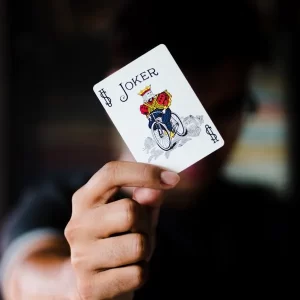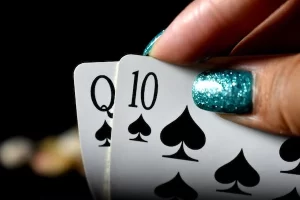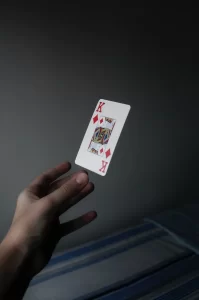 Gambling has been a popular form of entertainment for centuries, offering the allure of excitement and the possibility of winning big. However, for some individuals, what begins as a harmless pastime can escalate into a compulsive behavior with serious consequences. Gambling addiction, also known as ludomania or compulsive gambling, is a mental health disorder characterized by an uncontrollable urge to gamble despite negative repercussions.
Gambling has been a popular form of entertainment for centuries, offering the allure of excitement and the possibility of winning big. However, for some individuals, what begins as a harmless pastime can escalate into a compulsive behavior with serious consequences. Gambling addiction, also known as ludomania or compulsive gambling, is a mental health disorder characterized by an uncontrollable urge to gamble despite negative repercussions.
Identifying the warning signs of gambling addiction is crucial for early intervention and treatment. Here are some red flags to watch out for:
- Preoccupation with Gambling: One of the primary indicators of gambling addiction is an obsessive preoccupation with gambling activities. Individuals may spend an excessive amount of time thinking about gambling, planning their next bet, or reminiscing about past wins or losses.
- Inability to Control Gambling Behavior: People with a gambling addiction often find it challenging to control their gambling impulses. They may repeatedly attempt to cut back or stop gambling altogether but find themselves unable to resist the urge to gamble, even when faced with adverse consequences.
- Chasing Losses: A common behavior among individuals with gambling addiction is the tendency to chase losses. Instead of accepting defeat and walking away, they continue to gamble in hopes of recouping their losses, which can lead to further financial hardships.
- Financial Problems: Gambling addiction can take a significant toll on a person’s finances. Individuals may borrow money, max out credit cards, or deplete savings to fund their gambling habit. They may also resort to dishonest or illegal means to obtain money for gambling.
- Neglecting Responsibilities: As the addiction progresses, individuals may neglect their responsibilities at work, school, or home. They may miss deadlines, skip social engagements, or perform poorly in their professional or academic endeavors due to their preoccupation with gambling.
- Mood Swings and Irritability: Gambling addiction can have a profound impact on an individual’s emotional well-being. They may experience mood swings, ranging from euphoria during winning streaks to despair and anxiety during losing streaks. Irritability, restlessness, and agitation are also common symptoms.
- Hiding or Lying About Gambling: Many individuals with a gambling addiction go to great lengths to conceal their behavior from friends and family members. They may lie about their whereabouts, finances, or gambling activities to avoid scrutiny or judgment.
- Legal or Relationship Problems: Gambling addiction can strain relationships and lead to legal troubles. Individuals may face divorce, separation, or estrangement from loved ones due to their gambling behavior. They may also encounter legal issues such as bankruptcy, theft, or fraud.
- Failed Attempts to Stop Gambling: Despite their best efforts, individuals with a gambling addiction may struggle to quit on their own. They may make repeated promises to quit or cut back on gambling but find themselves unable to follow through.
- Seeking Help: Recognizing the need for help is a crucial step toward recovery. If you or someone you know is struggling with gambling addiction, seeking professional help from a therapist, counselor, or support group can provide the guidance and support needed to overcome the addiction and regain control of your life.
In conclusion, gambling addiction is a serious condition that can have devastating consequences if left untreated. By recognizing the red flags and seeking help early, individuals can take proactive steps toward recovery and reclaiming their lives from the grip of addiction.

 In the thrilling world of gambling, the line between entertainment and addiction can be thin. For some individuals, what starts as a harmless pastime can escalate into a compulsive behavior with far-reaching consequences. Recognizing the red flags of a gambling addiction is crucial in addressing the issue and providing timely support to those in need.
In the thrilling world of gambling, the line between entertainment and addiction can be thin. For some individuals, what starts as a harmless pastime can escalate into a compulsive behavior with far-reaching consequences. Recognizing the red flags of a gambling addiction is crucial in addressing the issue and providing timely support to those in need. Gambling, when done responsibly, can be a source of entertainment and recreation. However, it’s crucial to be aware of the fine line between casual betting and the onset of a gambling addiction. This article serves as a roadmap, guiding individuals on how to recognize red flags associated with gambling addiction.
Gambling, when done responsibly, can be a source of entertainment and recreation. However, it’s crucial to be aware of the fine line between casual betting and the onset of a gambling addiction. This article serves as a roadmap, guiding individuals on how to recognize red flags associated with gambling addiction.




 It is important for people to know that gamblers or addicted gamblers are not really capable of helping themselves out of the addiction, they need help from the people who claim they love them. Gambling addiction is a compulsive attraction and engagement that is psychologically created towards consistent gambling, regardless of the consequences that would come after.
It is important for people to know that gamblers or addicted gamblers are not really capable of helping themselves out of the addiction, they need help from the people who claim they love them. Gambling addiction is a compulsive attraction and engagement that is psychologically created towards consistent gambling, regardless of the consequences that would come after.